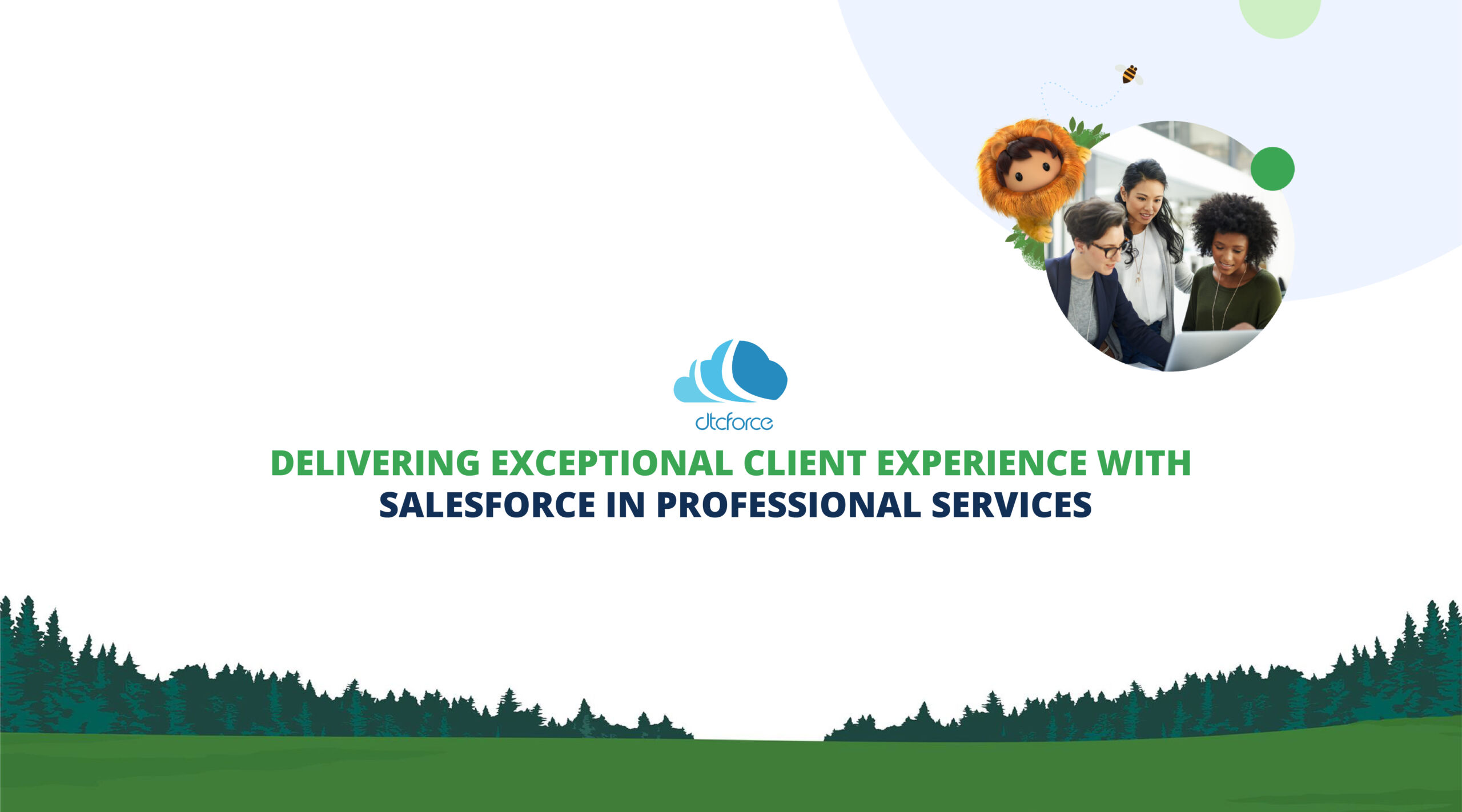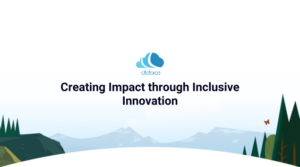Table of Content
- Introduction
- Understanding the Client Journey in Professional Services
- III. Leveraging Salesforce for Client Engagement
- Enhancing Project Management with Salesforce
- Driving Client Success with Salesforce Analytics
- Case Studies: Real-world Examples of Exceptional Client Experiences
- Conclusion
I. Introduction
According to a survey, 73% of customers say that they mainly consider customer experience first while making a purchase and 42% of customers would not mind paying more when they receive a more friendly and warm customer experience. With great customer experience, comes more profitable business and long-lasting relationships.
II. Understanding the Client Journey in Professional Services
A client journey includes all the interactions between the client and the brand. Companies that put their client’s priority, stay ahead, and build long-term relationships.
The key touchpoints that need to address are:
- Awareness regarding your brand provides the optimal solution they are seeking.
- The acquisition includes interaction that could be visiting your website or clicking on a free trial.
- Onboarding occurs after the client’s first purchase.
- Engagement is the best way to keep your clients up-to-date about new services and products.
- Retention is the phase where you make a way to stay engaged with your business by identifying potential risks and data.
- Loyalty stays when your client is happy and satisfied and returns the favor by providing positive feedback.
B. Challenges faced by professional services firms in delivering exceptional client experiences
One of the key challenges is higher expectations of the clients. Nowadays, clients require specific solutions according to their needs and preferences which is why professional services need to understand their clients more deeply.
C. How Salesforce can address these challenges and optimize the client journey
Salesforce enables professional services to build comprehensive client profiles to address their preferences and requirements.
Real-time analytics provide comprehensive information regarding clients’ interactions, behavior, purchases, and engagement.
Plus, Salesforce provides various secure communication tools to interact with clients.
III. Leveraging Salesforce for Client Engagement
A. Utilizing Salesforce Community Cloud to create a client-centric portal
Salesforce community cloud enables companies to create client-centric portals that increase customer engagement. Community cloud offers integration with other products and third-party applications, which provide a 360 view of the clients.
1. Customizing the portal to align with the firm’s branding and user experience
Salesforce Community Cloud enables businesses to customize the portal to address clients’ specific needs and visible to their brand identity. They can customize colors, logos, and portals’ overall design.
2. Enabling self-service capabilities for clients
Salesforce Community Cloud provides self-service options that enable clients to access relevant information, discussion, articles, and FAQs, and collaborate with employees.
B. Leveraging Salesforce Marketing Cloud for personalized and targeted client communications
1. Implementing automation and segmentation for tailored messaging
Salesforce Marketing Cloud enables businesses to deliver customized and send personalized messages to other clients. It enables us to divide the clients into specific groups based on their demographics, preferences, and past communications.
2. Tracking and analyzing client engagement to improve communication effectiveness
Salesforce Marketing Cloud enables businesses to track and analyze their clients and provides comprehensive insights into the other clients’ behavior and preferences, which leads the employees to make customized decisions. Through tracking and analyzing, brands can provide customized and personalized experiences and address their needs accordingly.
IV. Enhancing Project Management with Salesforce
A. Utilizing Salesforce Sales Cloud for effective project tracking and management
Salesforce enables businesses to track and manage their client’s records and engagement.
Managing client relationships, contacts, and opportunities
Salesforce Sales Cloud offers customized solutions that allow employees to manage their clients’ relationships throughout their journey. It allows for storage and access to client information, including opportunities and contacts in one platform to make better decisions and easy communication.
Tracking project milestones, tasks, and deliverables
Salesforce Sales Cloud helps the project manager to track the project’s progress and the milestones of different tasks and make deliverables on time.
B. Integrating Salesforce with project management tools for seamless collaboration
Syncing project data between Salesforce and project management platforms
Project data may be automatically synced by connecting Salesforce with project management solutions, reducing away the need for human data entry. Data inconsistencies are less likely as a result, and consistency is ensured across systems.
Streamlining communication and ensuring real-time visibility into project progress
Team members can communicate easily due to the integration of Salesforce with project management software. Stakeholders can keep up to date on project status, task assignments, and approaching deadlines since updates made on either platform are reflected in real time.
V. Driving Client Success with Salesforce Analytics
A. Harnessing Salesforce Einstein Analytics for data-driven insights
1. Analyzing client data to identify trends and opportunities
Using Salesforce Einstein Analytics, we can examine customer data to spot patterns and find new possibilities. Consequently, we may better personalize our services to fit the demands of our clients by gaining insightful information about their habits, preferences, and requirements.
2. Predictive analytics for proactive client engagement and issue resolution
Predictive analytics may be used with Salesforce Einstein Analytics to predict customer demands and behaviors. We may proactively connect with clients, identify possible issues before they develop, and offer individualized solutions by examining previous data and patterns. This proactive strategy improves client satisfaction and fortifies our connections.
B. Utilizing dashboards and reports for performance tracking and transparency
1. Monitoring key performance indicators (KPIs) related to client experiences
Key performance indicators (KPIs) that directly affect customer experiences may be readily tracked by leveraging dashboards and reporting in Salesforce Analytics. As a result, we can monitor KPIs like response time, client satisfaction levels, and quality of service. By closely monitoring these KPIs, we can spot potential improvement areas and take proactive steps to raise client satisfaction.
2. Making data-informed decisions to improve client satisfaction and outcomes
We can increase client satisfaction and outcomes by using Salesforce Analytics to provide us with access to extensive data. It gains important information about customer needs, problems, and expectations by examining the data.
VI. Case Studies: Real-world Examples of Exceptional Client Experiences
A. Highlighting success stories of professional services firms using Salesforce
Out In The Cloud is a technology consultancy firm based in Australia. Before implementing Professional Service Automation (PSA) in their system, they used several tools and software to streamline their projects but this resulted in fewer conversion rates, lower data visibility, and lost customer engagement. Finally, they partnered with Salesforce and reached their success level. PSA helps them streamline their workflow, easy-to-track resources, and better data visibility which helps them to make better decisions.
VII. Conclusion
Salesforce has completely changed how companies provide outstanding customer experiences. Numerous advantages, including simplified communication, effective data administration, and customized interactions help businesses enhance client relations. Salesforce enables businesses to take customer experiences to new levels, building lasting relationships.
Firms providing professional services are urged to use Salesforce as a potent client-centricity tool. Businesses may consolidate customer data, manage interactions, and obtain insightful data to tailor their offerings by implementing Salesforce. The platform’s automation features allow for effective processes, which reduce waiting time and increase productivity.
In the professional services sector, customer experiences are likely to undergo significant changes in the future.
Salesforce will keep developing, providing cutting-edge features and integrations to help businesses meet changing customer demands. In the future of professional services with Salesforce, providing outstanding client experiences will depend on finding the right balance between technology and customized connections.
DTC Force is one of the best salesforce consulting firms, enabling organizations to elevate their customer experience by integrating Salesforce into their system.







